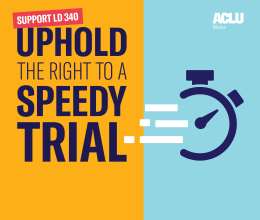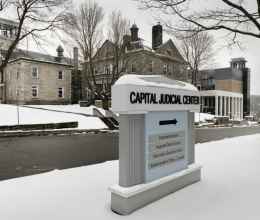On Sunday, the Portland Press Herald published this story on the number of people incarcerated for failing to pay a criminal fine in Maine and the enormous cost to taxpayers. According to research by the ACLU of Maine, every year thousands of Mainers are booked into county jails for no other reason than failing to pay a criminal fine. In some counties, almost 20 percent of total jail bookings were just for unpaid fines.
In Maine, a fine can be a part of the sentence for any crime - from very serious violent offenses, to very minor low-level ones. Every year thousands of Mainers are ordered to pay court-ordered fines, fees and restitution. For those with financial resources a fine is likely not that big a deal; in fact, it may be the best option available to hold a person accountable. However for those who cannot afford to pay, a fine can unnecessarily prolong their time in the criminal justice system and entrap them in a repeat cycle of arrests and incarceration.
In Maine, if the court becomes aware that a fine payment is more than 30 days overdue a bench warrant is issued for your arrest, your driving license is suspended (with a $60 reinstatement fee) and a late fee (which can be as much as 50 percent of the original fine amount - i.e $50 dollar late fee on a fine that is a $100) added to your fine. You are then arrested and booked into jail, where you must wait until you are able to go before a judge - which if you have the misfortune to be arrested on a Friday will be the entire weekend. Once before a judge, if he or she decides the default on your payment was unexcusable they can sentence you to a term of incarceration to "pay down" your fine at a daily reimbursement rate as low as $5 dollars per day.
Not surprisingly, incarcerating thousands of people for unpaid fines is enormously expensive. In Cumberland County, just over a four month period, it cost the county over $25,000 to recoup (credit given for incarceration, not money actually collected) $10,000 in unpaid fines. This is not even the full cost of our current system as this number does not include the cost to issue a warrant, cost to make an arrest and the cost to the courts of holding numerous fine hearings.
But the kicker to this is, in large part, we are where we are because lawmakers were trying to raise revenue. Fines have been steadily increased over time, and in 2005, as a way to balance the budget, lawmakers made many fines mandatory, meaning that even if a judge determines that a fine is not an appropriate sanction or a person cannot afford to pay the fine amount they have no discretion to waive or reduce the fine amount.
Clearly, the math didn't quite add up as expected.
But even if it was generating revenue, incarcerating people for unpaid fines is still unconstitutional and a deeply misguided use of our criminal justice system.
In 1983, the Supreme Court ruled in the case of Bearden vs. Georgia that imprisoning someone simply because they are too poor to pay is illegal under the U.S. Constitution. The case involved Danny Beardon who, in 1980, was found guilty of burglary and receiving stolen property and sentenced to three years probation and ordered to pay $750 in restitution. However, after losing his job, Danny was unable to get work and soon defaulted on his payment. A lower court revoked his probation and sentenced him to serve the remainder of his sentence behind bars. However, the Supreme Court ruled that imprisoning Danny simply because he could not afford to pay his debts, despite making a bona fide effort to do so, violated the Equal Protection Clause of the Fourteenth Amendment as it made our criminal justice system more punitive to the poor. In other words, sending someone to jail just because they are poor is not only unfair, it is unconstitutional.
And yet, as our research found, every year thousands of Mainers are arrested for no other reason than failing to pay a criminal fine. In Bearden, the court ruled that prior to incarcerating a person for failure to pay a fine or restitution, an inquiry has to be made into his or her ability to pay. In Maine, however, arrest warrants are routinely issued prior to consideration into a person's ability to pay (over 1 in 5 people arrested for failure to pay a fine in Cumberland County were listed as "homeless" or "transient" at the time of their arrest), and in the case of mandatory fines, where even if a judge determines a person does not have the ability to pay they have no discretion to waive or reduce the fine amount - in direct violation of the Bearden decision.
And like Bearden warned, our current fine system has set up a two-tired system of justice where people who cannot pay their fines face harsher sentences, for even just low-level crimes. Take for example two of the cases profiled in the Portland Press Herald article: Connor Comeau, who was only sentenced to serve 48 hours in jail for spray painting a train car when he was 19 years old but ended up serving 100 days in jail, just due to his unpaid fine; Or Eric Gould, who served 64 days in jail for fines stemming from a marijuana related offense, even though we routinely hear from prosecutors (ahem, D.A. Anderson) that no one is in jail for marijuana.
Beyond its constitutional infirmity, Maine's current criminal fine system undermines the very integrity of our justice system and is deeply misguided. The focus of our criminal justice system should be exclusively on protecting public safety and rehabilitation, not revenue generation. Incarceration, deprivation of our physical freedom, is one of the most severe sanctions our government can impose, and therefore should be reserved for severe crimes. No one should be facing harsher penalities just because they are poor and judges should be impartial adjudicators, not de facto criminal justice taxmen, tasked with extracting revenue from likely indigent defendants. Arrest warrants should only be utilized when a person is suspected of a serious crime, not as a means to coerce payment. During our research, we were particularly disturbed to find out that the Maine State Judicial Branch has no centralized database on the number of people with unpaid fines or the number of warrants they had sent out for unpaid fines. In other words, our judges have no idea how many fines they have imposed or how many people they are sending to jail for unpaid fines.
Overreliance on use of our prisons and jails is why we have mass incarceration and America is by far the number one incarcerator in the world. I can think of no better example of misuse of incarceration than imprisonment for unpaid fines. Poverty is not a crime one should be facing jail time for, simply due to non-payment of a fine. Ending Maine's debtors prison is an important step towards ending mass incarceration in our state.








